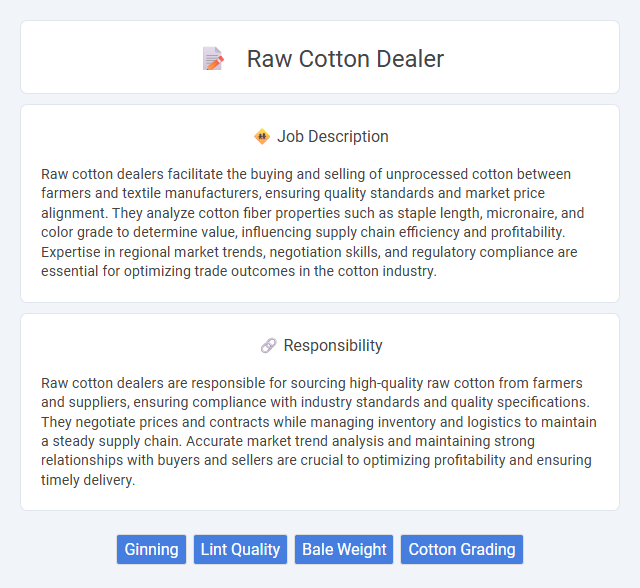
Raw cotton dealers facilitate the buying and selling of unprocessed cotton between farmers and textile manufacturers, ensuring quality standards and market price alignment. They analyze cotton fiber properties such as staple length, micronaire, and color grade to determine value, influencing supply chain efficiency and profitability. Expertise in regional market trends, negotiation skills, and regulatory compliance are essential for optimizing trade outcomes in the cotton industry.
Raw cotton dealer jobs may be suitable for individuals who are physically fit and able to handle manual labor in potentially dusty and demanding environments. People with strong negotiation skills and an understanding of market fluctuations could probably excel in this role. Those sensitive to allergens or seeking a strictly office-based position might find this job less suitable.
Qualification
A raw cotton dealer should possess strong knowledge of cotton varieties, market trends, and quality grading standards to accurately assess and negotiate deals. Proficiency in supply chain logistics, inventory management, and basic business accounting is essential for efficient operations and profitability. Candidates with a background in agriculture, textile management, or business administration tend to perform better in this role.
Responsibility
Raw cotton dealers are responsible for sourcing high-quality raw cotton from farmers and suppliers, ensuring compliance with industry standards and quality specifications. They negotiate prices and contracts while managing inventory and logistics to maintain a steady supply chain. Accurate market trend analysis and maintaining strong relationships with buyers and sellers are crucial to optimizing profitability and ensuring timely delivery.
Benefit
A Raw cotton dealer is likely to benefit from lucrative profit margins due to the high demand for raw cotton in textile and garment industries. Opportunities for building strong networks with farmers and manufacturers may improve business stability and growth potential. Consistent market demand could provide a steady income stream and chances for long-term career advancement.
Challenge
A raw cotton dealer likely faces challenges related to market price volatility and quality assessment, which require sharp negotiation and analytical skills. Establishing reliable supplier and buyer relationships may be difficult due to competition and trust factors. Managing logistics efficiently can pose additional hurdles, impacting timely delivery and overall profitability.
Career Advancement
Raw cotton dealers play a crucial role in the textile supply chain by sourcing high-quality raw cotton from producers and ensuring efficient transactions with manufacturers. Career advancement in this field often involves gaining expertise in market trends, negotiation skills, and developing strong relationships with farmers and industry stakeholders. Experienced dealers can progress to roles such as regional managers, supply chain coordinators, or become independent traders with expanded networks and greater influence in the cotton industry.
Key Terms
Ginning
Raw cotton dealers specializing in ginning oversee the procurement and sale of unprocessed cotton directly from farms, facilitating the initial stage of cotton processing. They coordinate with ginning mills to ensure timely conversion of raw cotton into lint, optimizing fiber quality and market value. Expertise in quality assessment, supply chain logistics, and knowledge of cotton market trends are essential for maximizing profitability in this role.
Lint Quality
A raw cotton dealer's primary responsibility involves evaluating the lint quality to determine its suitability for textile manufacturing. Assessing fiber length, strength, fineness, and cleanliness ensures buyers receive raw cotton that meets industry standards. Precise grading of lint quality directly impacts pricing, supply chain efficiency, and fabric performance in downstream processes.
Bale Weight
Raw cotton dealers specialize in procuring and trading cotton bales, where accurate bale weight measurement is crucial for pricing and quality assessment. Each bale typically weighs between 400 to 500 pounds, influencing transportation costs and market value. Expertise in bale weight estimation helps dealers negotiate effectively and maintain supply chain efficiency.
Cotton Grading
Raw cotton dealers specialize in sourcing high-quality cotton by expertly assessing fiber properties such as staple length, strength, micronaire, and color grade. Precise cotton grading ensures accurate valuation and meets textile industry standards, directly impacting price negotiation and supply chain efficiency. Proficiency in distinguishing contaminants and fiber uniformity is essential for maintaining market competitiveness and customer satisfaction.
 kuljobs.com
kuljobs.com